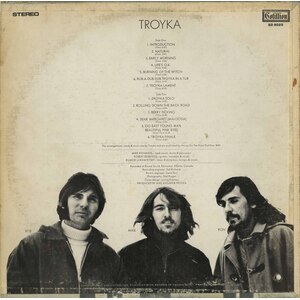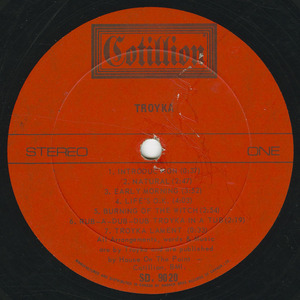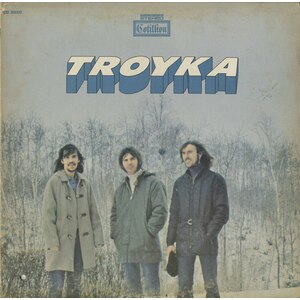Information/Write-up
Canada’s Weirdest Power Trio: A Deep Dive into Troyka
In the unrelenting surge of North American psychedelic rock, few records are as defiantly strange, inventive, and flat-out singular as Troyka, the lone 1970 album from the Edmonton, Alberta trio of the same name. Released on Atlantic’s Cotillion label and long out of print until its 2014 reissue by Real Gone Music (with a deluxe vinyl edition following in 2024), Troyka is a warped masterpiece that straddles Eastern European folk, power-trio prog, hard psych, comedy, and countercultural defiance — all executed with the frenetic energy of a band that knew exactly what it was doing, even when no one else did.
The Story Behind the Madness
Formed from the ashes of The Royal Family — an Edmonton group that issued two beat-era singles for Apex in 1965 — Troyka came together when guitarist Robert Edwards and bassist Ron Lukawitski (later stylized as Rumor Lukawietsky) recruited drummer and vocalist Mike Richards. By 1969, they had built their own state-of-the-art studio in the basement of Richards’ father’s house (Dr. Ted Richards, who served as the band’s manager and recording engineer), making them one of the first groups in Western Canada to track with an Ampex MM1000 8-track machine.
Their self-produced album was shopped around major labels before catching the ear of New York producer Shel Kagan. Atlantic Records agreed to release it on Cotillion, sending Kagan and engineer Gene Paul (son of Les Paul) to Edmonton for remixing sessions at Round Sound Studios. Though the band had mixed feelings about the final edits and cover photo, the deal was done. Troyka was unleashed in March 1970 with little fanfare — and little precedent.
The Sound of Troyka
To describe the album as psychedelic would be too limiting. It’s progressive, yes, but not in the classical, mellotron-heavy sense of British prog. It’s heavy, but not metal. It’s funny, but not novelty. It’s ethnic, but not traditional. What Troyka manages is something altogether alien — and totally deliberate.
Tracks like “Natural” and “Berry Picking” lurch with funk grooves, absurdist sexual innuendo, and gruff vocals that sound like a Harley-driving carnival barker. The warped nursery rhyme “Rub-A-Dub-Dub Troyka in a Tub” pairs shouted Polish-English taunts with fuzzed-out bass and surrealist guitar licks. “Rolling Down the Back Road,” perhaps their finest moment, struts with raw power: Edwards’ molten fuzz leads, Lukawietsky’s cool walking bass, and Richards’ throaty bellow conjure an image of sweaty basement jams and psychedelic chaos.
Elsewhere, the band pivots entirely: “Dear Margaret (Malgosia)” is a mournful instrumental love song, featuring Richards singing in Polish and Edwards on mandolin. “Early Morning” delivers gentle, folk-influenced psychedelia with woodblocks, triangle, and dreamy guitar layering. And the closer “Go East Young Man Beautiful Pink Eyes” fuses prog grandeur with wild wah solos, folk modes, and spoken word. The whole thing is capped with “The Wedding Song” (included as a bonus on later reissues), a sincere, swirling piece that adds emotional depth to the chaos.
Lyrical Imagery and Subversion
One of the album’s defining traits is its satirical edge. The band never took themselves too seriously — but their musicianship was always tight. As Richards put it in the Ugly Things retrospective:
“We were probably the straightest band in the world. We didn’t play one note under the influence of anything other than youthful energy.”
That energy translated into humor, double entendres, Eastern Bloc sarcasm, and unpredictable arrangements that mocked mainstream expectations. The band’s vocal personas — especially Richards’ throaty growl — were, by his own admission, created to get attention. “I just made that up because I figured, ‘How do we get attention?’” he said. “And the thing of it is, it got us a record deal.”
Reception and Legacy
Critics didn’t know what to make of Troyka. Rolling Stone misidentified them as Russian and called the album “third-grade stuff,” likening the drumming to “a sadistic German cuckoo clock.” But audiences — especially live — knew better. At New York’s Fillmore East in February 1970, the band received three encores and accolades from promoter Bill Graham. They opened for The Byrds, Canned Heat, Savoy Brown, and even shared stages with Family and Mountain. Their explosive shows featured Troyka originals, unreleased jams like “The Ukrainian Wedding,” and Richards’ acrobatic stage antics, including backflips behind the drum kit.
But just as the band was gaining steam, internal tension surfaced. Edwards quit the group after a gig in Toronto, urged by his soon-to-be wife Margaret. A legal dispute followed. Troyka tried to carry on with guitarist Bob Styrna and recorded a third album, but label interest had evaporated. By 1971, the band was finished.
Aftermath and Rebirth
Mike Richards eventually left the industry, releasing one indie album in 1980 before retreating from public life. Edwards and Lukawietsky remained musically active and even reunited for a Troyka tribute performance in Edmonton in 2006. The band’s only album was bootlegged for decades until Real Gone Music issued the first authorized reissue in 2014, sourced from the original master tapes and complete with liner notes by Ugly Things’ Doug Sheppard. In 2024, a deluxe vinyl reissue on Sun King (SUN 11) brought the record to a new generation of psych and prog collectors.
Conclusion
Troyka is not just a relic — it’s a document of raw, fearless, and subversive artistry from a time when rock was still figuring out its outer limits. It's an album that never flinches, never conforms, and never apologizes for its madness. To this day, it remains one of Canada’s most bizarre and brilliant full-length debuts — a record that could’ve only come from the snowy prairies, a basement studio, and three Slavic-Canadian visionaries with nothing to lose.
-Robert Williston
Mike Richards: lead vocal, drums, percussion
Robert Edwards: guitars, mandolin, vocals
Rumor Lukaweitsky: bass, 8 string bass, bongos, vocals





No Comments